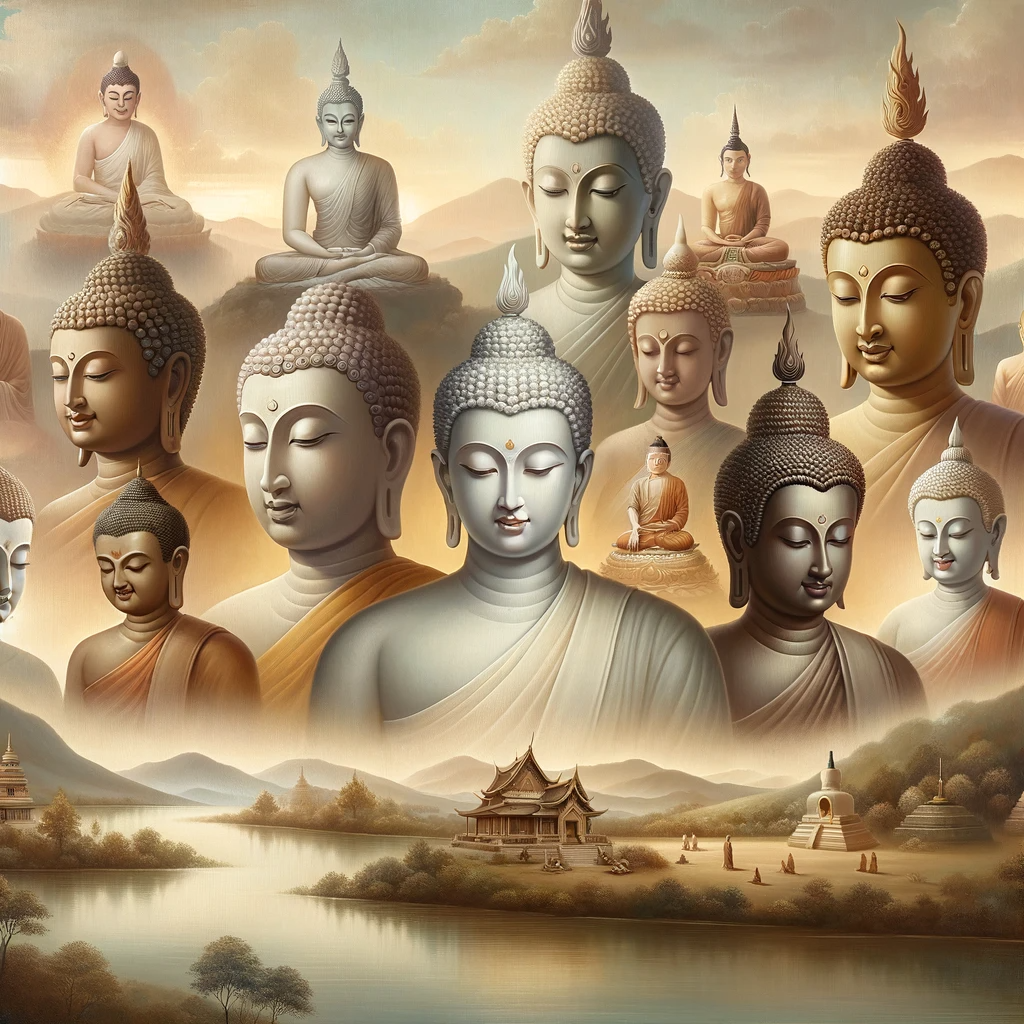
Introduction
Buddhism, a spiritual path with deep roots in history and culture, offers a rich tapestry of teachings and figures, central to which are the Buddhas. This exploration delves into the question, ‘How many Buddhas are there?’ – a query that opens doors to understanding the diverse and profound aspects of Buddhist philosophy.
The Concept of Buddha in Buddhism
Understanding Buddha: In Buddhism, ‘Buddha’ signifies an ‘awakened one‘, a being who has achieved a state of perfect enlightenment and imparts wisdom about the Dharma (Buddhist teachings). This concept transcends beyond a singular figure to encompass various embodiments of enlightenment.
Diverse Representations: Buddhism speaks of multiple Buddhas, each symbolizing different spiritual truths and paths. These include the historical Buddha, Siddhartha Gautama, and others like Amitabha and Medicine Buddha in Mahayana Buddhism, each with their unique teachings and symbolism.
Numerical Interpretations Across Traditions
The count of Buddhas varies across different Buddhist schools of thought:
- Theravada Buddhism: Focuses primarily on the historical Buddha, Siddhartha Gautama, and acknowledges past Buddhas.
- 2. Mahayana Buddhism: Introduces an expansive realm of celestial Buddhas, like Amitabha, who oversee various Buddha realms.
- 3. Vajrayana Buddhism: This esoteric branch recognizes a myriad of Buddhas, each associated with specific tantric teachings.
Buddhas Across Buddhist Traditions
| Tradition | Number of Buddhas | Key Figures |
| Theravada | Several Known | Siddhartha Gautama, Kakusandha |
| Mahayana | Numerous | Amitabha, Akshobhya |
| Vajrayana | Extensive List | Vajrasattva, Samantabhadra |

Symbolism and Teachings of Various Buddhas
Each Buddha brings forth unique teachings and symbolisms. For instance, Amitabha Buddha embodies infinite light and life, guiding followers towards a pure land of bliss and enlightenment.
Pros and Cons of Diverse Buddha Interpretations
Pros:
- Rich Spiritual Tapestry: The multitude of Buddhas enriches the Buddhist tradition with a wide range of teachings and paths to enlightenment.
- Inclusivity and Diversity: This diversity allows followers from various cultural and spiritual backgrounds to find a Buddha that resonates with them.
Cons:
- Complexity for Learners: The vast number of Buddhas can be overwhelming for those new to Buddhism.
- Interpretational Variations: Different Buddhist sects interpreting Buddhas differently can lead to confusion.
Web Ratings
Depth of Insight: 9/10
Cultural Relevance: 8/10
Approachability for Beginners: 7/10
FAQs on Buddhas in Buddhism
Q: Who is the first Buddha in Buddhism?
A: According to Buddhist texts, the first Buddha is Vipassi, who lived eons before Siddhartha Gautama, the most widely known Buddha.
Q: Is Siddhartha Gautama the only Buddha?
A: No, Siddhartha Gautama, known as Shakyamuni Buddha, is just one of many Buddhas acknowledged in Buddhism.
Q: What are some common teachings of all Buddhas?
A: Despite their diversity, all Buddhas share teachings on the Four Noble Truths, the Eightfold Path, and the pursuit of enlightenment and Nirvana.
Q:How does one become a Buddha in Buddhism?
A: Attaining Buddhahood requires mastering the Dharma, practicing virtues like compassion and wisdom, and achieving complete enlightenment.
Q:Are there female Buddha in Buddhism?
A: Yes, in certain Buddhist traditions, there are female Buddha or enlightened beings, such as Tara in Tibetan Buddhism.
Q:How does Mahayana Buddhism view Buddha compared to Theravada?
A:Mahayana Buddhism tends to view Buddha more cosmically and symbolically, with a greater emphasis on celestial Buddha, compared to the historical focus of Theravada.
Q:Can Buddha be considered gods in Buddhism?
A: In Buddhism, Buddha are not seen as gods, but as enlightened beings who have transcended the cycle of birth and death.
Q:What is the significance of Amitabha Buddha in Mahayana Buddhism?
A: Amitabha Buddha, central to Pure Land Buddhism, embodies infinite light and life, offering the promise of rebirth in a blissful pure land.






Lots of people use their lotteries to improve money for beneficial initiatives that improve education, general public infrastructure and sociable services.
When the lottery will be played by you, you’re helping to finance these
programs when you finance your own ambitions of earning it
big. Have fun and good luck!